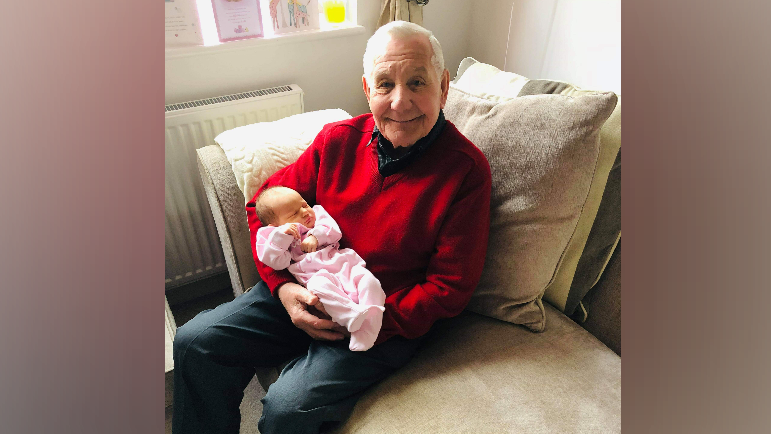Grandad 'dismissed as old man' amid stroke delay

George Fawcett, pictured with one of his great-grandchildren, had a spinal stroke which should have been diagnosed earlier, the PHSO said
- Published
The family of a great-grandfather who died after a spinal stroke, which went undiagnosed for nine days, say he was dismissed as an "old man with mobility problems."
George Fawcett, 86, from Spennymoor, County Durham, died after he was admitted to the University Hospital of North Durham in May 2021.
His family complained to the Parliamentary and Health Service Ombudsman (PHSO) who said an earlier diagnosis could have helped Mr Fawcett live longer, potentially giving him more time with family.
A spokesperson for County Durham and Darlington NHS Foundation Trust apologised and said "spinal strokes are rare and complex to diagnose".
Mr Fawcett, a former ambulance driver in the RAF, had chest pain, weakness in his legs and arms, and a rapid decline in mobility leading to paralysis when he was admitted to hospital.
The great-grandfather-of-two was not immediately referred to the neurology department when an MRI scan was ordered, but instead wrongly referred to the orthopaedics department, the report found.
He was sent back to neurology where doctors suspected he might have had a spinal stroke.
Mr Fawcett should have referred to a stroke unit within 24 hours but he was not seen by a stroke consultant until four days later, the PHSO said.
It was another three days before he was moved to a specialist unit at another hospital, run by a different trust, where clinicians diagnosed him with a spinal stroke. He died two days later.
'No-one listened'
Daughter Sandra Todd said the care her father received "felt very fractured".
She said despite raising concerns to the hospital "no-one would listen" and they did not realise Mr Fawcett had a stroke as early as he did until the investigation.
"My dad had some underlying health problems and had had a stroke 14 years earlier, but before he went to hospital he was independent, mobile, playing bowls several times a week, going shopping independently, and seeing his friends," she said.
"But the doctors at the hospital just seemed to dismiss him as an old man with mobility problems. They didn't see what was really happening.
"Given his history of having a stroke before and his symptoms at the time, it was devastating to find out that they completely missed the signs."
While the ombudsman found Mr Fawcett's death to be unavoidable, they concluded there were serious failings and his care fell below the standard expected.
The PHSO investigation concluded his stroke should have been diagnosed earlier than it was. Had this happened, he would have been moved to a specialist stroke centre earlier.
The ombudsman also found he was denied a dignified death as he developed pressure sores that were not treated properly at the University Hospital of North Durham.
It has recommended an action plan to the trust to prevent this happening again and for it to pay the family a financial remedy, which the trust has agreed to comply with.
'Committed to change'
A spokesperson for County Durham and Darlington NHS Foundation Trust said: "We extend our deepest sympathies to Mr Fawcett's family for their loss and the distress they have experienced.
"We are very sorry that the care he received did not meet the standards we aim to provide.
"Following a full investigation, we have developed and shared a detailed action plan with our teams to support learning and prevent recurrence.
"We are also strengthening clinical awareness of atypical stroke presentations and continuing to improve our approach to pressure ulcer prevention and wound care.
"We are committed to listening, learning and making the necessary changes to improve the care we provide."
It comes as England's health ombudsman has warned of concerns about the diagnosis and care of stroke patients after the number of its investigations rose by two-thirds.
Between 1 April 2021 and 31 March 2025, the PHSO saw a 25% rise in complaints and a 65% rise in the number of investigations related to strokes.
The ombudsman said it had seen repeated failings in diagnosis, nursing care, communication and treatment.
Follow BBC Tees on X,, external Facebook, external, Nextdoor and Instagram, external.
Get in touch
Do you have a story suggestion for BBC Tees?